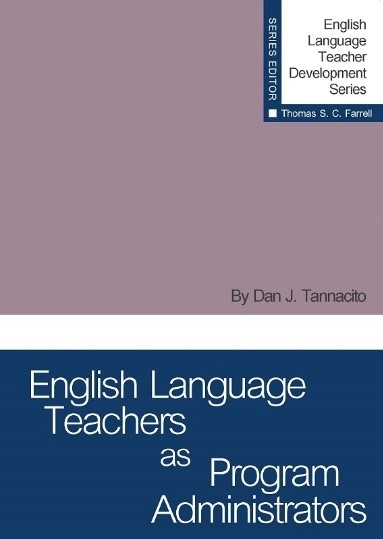Christie Sosa
 English Language Teachers as Program Administrators by Dan J. Tannacito & Language Teacher Professional Development by Thomas S.C. Farrell
English Language Teachers as Program Administrators by Dan J. Tannacito & Language Teacher Professional Development by Thomas S.C. Farrell
By Erin O’Reilly and Kara Mac Donald
An installment of the CATESOL 2020 FALL Book Review Sequence for Busy Teachers – Featuring TESOL Press ELT Development Series & English Language Teacher Development Series, Editor Thomas S.C. Farrell and ELT in Context Series, Editor Andy Curtis
Quick Recap to the 2020 Fall Book Review Sequence for Busy Teachers
The CATESOL Blog Book Review column is offering reviews of short booklets from three development series out of the TESOL Press edited by Thomas S.C. Farrell or Andy Curtis for the CATESOL 2020 fall issues. The goal is to provide members with accessible short practice-based and pedagogical-oriented texts that are highly relevant to inform online instruction, provide support and accessible professional development to teachers in the current COVID19 teaching environment.
English Language Teachers as Program Administrators, by Dan Tannacito, invites the reader to explore different areas of program administration through the lens of self-directed professional development. The book is divided into five chapters: What, Me? An Administrator?, Managing People in English Language Programs, Curriculum and Technology, Administering Evaluations, and Conclusions. Each chapter includes a series of Reflective Breaks that offer tangible steps the reader should take to explore a given topic. The author focuses on intensive English programs (IEPs) as the context for exploring the role of the language program administrator, which, having been published in 2013 during the upward trend of the IEP industry in the US, makes sense. This review covers selected chapters.
 The first chapter highlights the diverse skill sets administrators need in IEP programs, including marketing, financial savvy, personnel management, and policy making, all skills that fall outside the normal daily responsibilities of the classroom teacher (p. 9). Further, he offers a range of administrative roles teachers can take outside of management, such as Technology Coordinator and Student Advisor. For the reflective activity, teachers engage in listing skills, courses, or experiences they will need to prepare themselves for administration. Additionally, they explore the different roles administrators may take and reflect on which of those roles may be a good fit.
The first chapter highlights the diverse skill sets administrators need in IEP programs, including marketing, financial savvy, personnel management, and policy making, all skills that fall outside the normal daily responsibilities of the classroom teacher (p. 9). Further, he offers a range of administrative roles teachers can take outside of management, such as Technology Coordinator and Student Advisor. For the reflective activity, teachers engage in listing skills, courses, or experiences they will need to prepare themselves for administration. Additionally, they explore the different roles administrators may take and reflect on which of those roles may be a good fit. Chapter three explores curriculum and technology. Again, coming from the IEP context, the author presents a series of assumptions and underlying practices common to IEPs. He asks the reader to reflect on the practice of multi-level programs where social promotion is a common practice. Conversations around technology’s use and integration into the classroom are particularly relevant given the recent transition to online instruction throughout our learning communities. The author grounds the conversation in the teacher’s own experiences with technology, the reality of diverse skill sets in the workforce, and the TESOL Technology Standards (2011).
Chapter four shifts to the critical role testing plays within the IEP context. Administrators need a firm understanding of how tests place students in multi-level programs, along with a reflective activity exploring the reader’s assumptions and opinions on standardized testing in general.
To its credit, the topics covered in English Language Teachers as Program Administrators largely reflect my time as an IEP administrator. Today’s teacher will benefit from the book’s guidance when read through the lens of skills development for a fluid area of the TESOL field, or in the words of Tannacito, “taking on administrative functions, either part time or full time, should not be regarded as a burdensome distraction but as a valuable asset” (p.3).
Erin N. O’Reilly is a program administrator with the Defense Language Institute Foreign Language Center, Monterey, CA, where she oversees institutional accreditation.